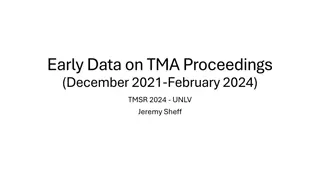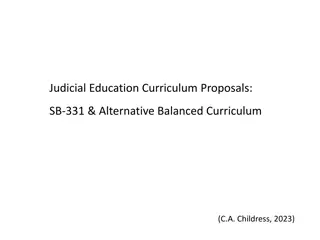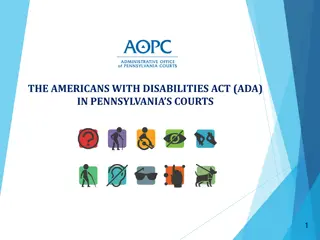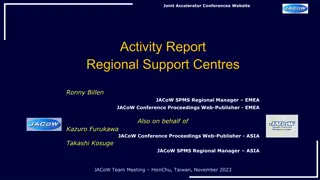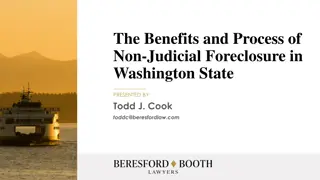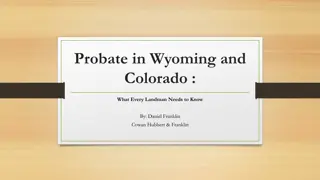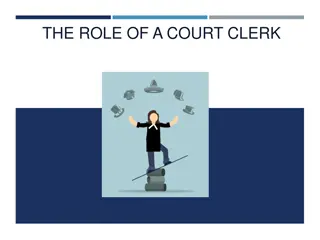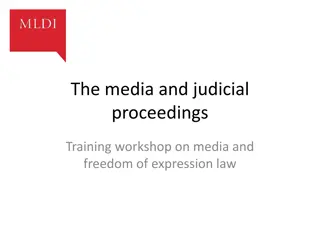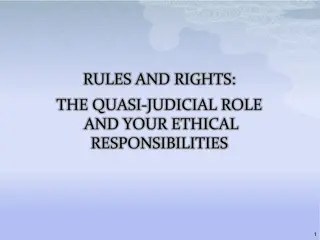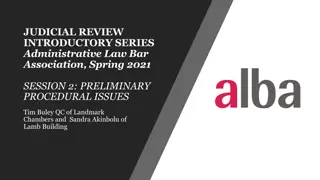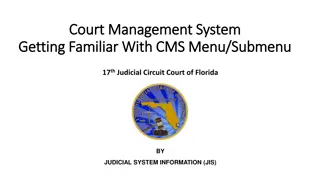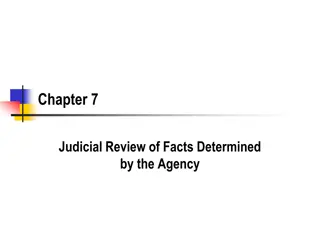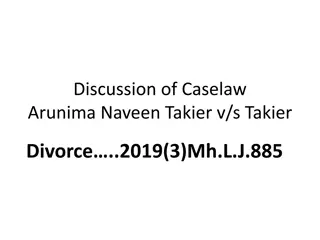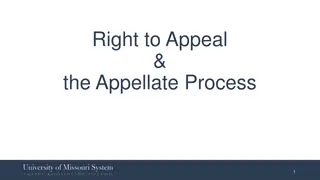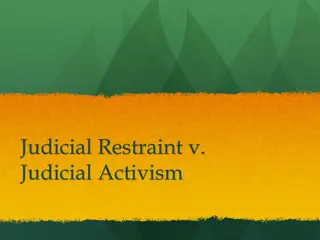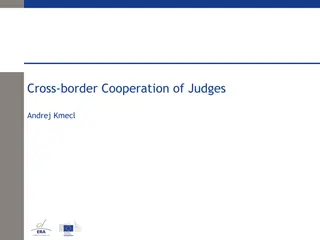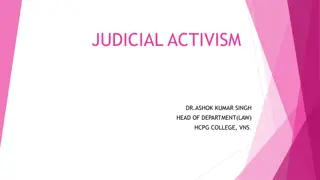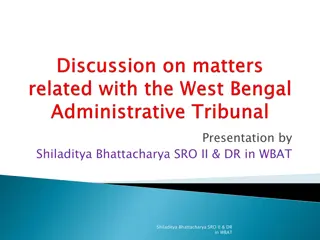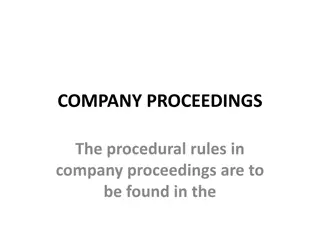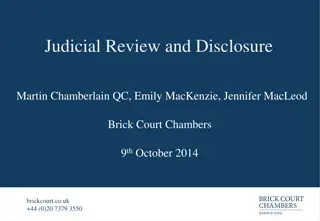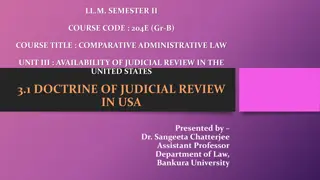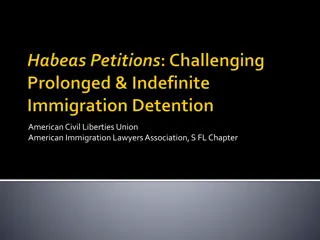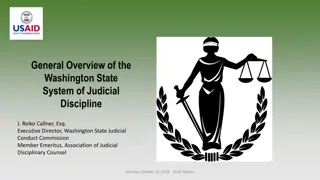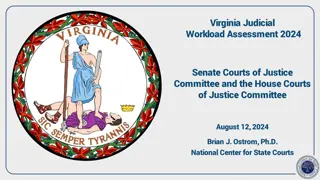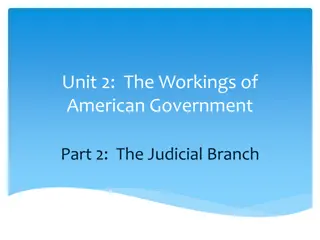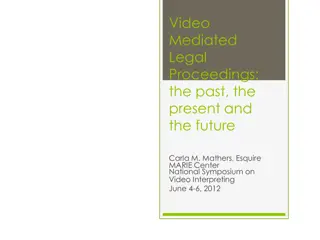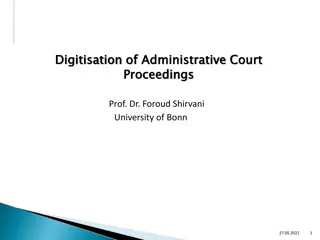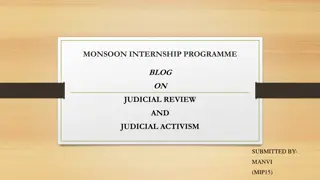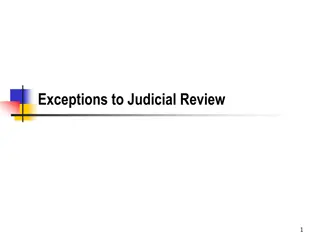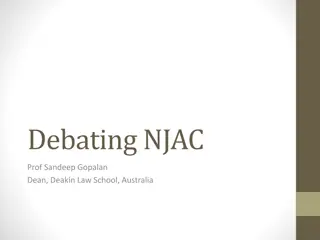Insights into TMA Proceedings and Trademark Decisions
Explore data on TMA proceedings from December 2021 to February 2024, including expungement and reexamination statistics, filing bases, raw numbers, and USPTO activities. Gain valuable information on trademark decisions and proceedings, along with insights into post-registration audit program statist
0 views • 10 slides
Judicial Education Curriculum Proposals: SB-331 Overview
This content presents a series of proposals under SB-331 focusing on judicial education curriculum enhancements. It covers topics such as child abuse, psychological control, bias, trauma, intimate partner violence (IPV), and more. The proposals aim to equip judicial professionals with knowledge and
1 views • 15 slides
JUDICIAL REVIEW OF NATIONAL ACTION BY UNCLOS COURTS AND TRIBUNALS
International judicial review involves oversight by international courts and tribunals over the actions of States Parties in implementing their international commitments. UNCLOS courts exercise supervisory jurisdiction through grounds of review like due regard, reasonableness, necessity, and proport
1 views • 7 slides
THE AMERICANS WITH DISABILITIES ACT (ADA)IN PENNSYLVANIA’S COURTS
Title II of the Americans with Disabilities Act (ADA) ensures that no qualified individual with a disability can be excluded or discriminated against in accessing public entity services, including courts in Pennsylvania. The Unified Judicial System in Pennsylvania has policies and designated ADA Coo
1 views • 37 slides
Overview of Joint Accelerator Conferences Activities
The report provides insights into the activities and support for conferences by the Joint Accelerator Conferences Website, including regional support centers and conference proceedings management. It covers the deployment of the SPMS system, synchronization of future and past conferences, status of
0 views • 6 slides
Florida Judicial Ethics 2024: Learning Objectives and Resources
Explore common problems under the Code of Judicial Conduct, develop solutions and strategies, and utilize available resources to ensure ethical conduct in the judicial system. Judge Kroll and Mr. Teagle provide educational content but encourage individual analysis. Consult the Florida Judicial Code,
1 views • 81 slides
Overview of Non-Judicial Foreclosure Process in Washington State
Understanding the benefits and process of non-judicial foreclosure in Washington State, including the definition of foreclosure, two types of foreclosures, the reasons for choosing non-judicial foreclosure, who is eligible for this process, and the steps involved, such as the notice of default and t
0 views • 14 slides
Probate in Wyoming and Colorado: Essential Guide for Landmen
Probate is the legal process of transferring a deceased person's property to a living individual. Whether probate is necessary depends on how assets were owned at the time of death. In Wyoming and Colorado, probate proceedings vary based on different ownership structures. Establishing the death of a
5 views • 30 slides
The Role of a Court Clerk in Manitoba
Court clerks play a vital role in the judicial system of Manitoba, assisting in court proceedings, maintaining order in the courtroom, recording decisions accurately, and handling sensitive evidence. They are responsible for various duties such as monitoring court proceedings, preparing dockets, han
0 views • 16 slides
Importance of Media in Judicial Proceedings: Safeguarding Fair Trials
Media plays a crucial role in ensuring the right to a fair trial by providing transparency, scrutiny, and accountability in judicial proceedings. Open justice, supported by media coverage, helps prevent miscarriages of justice and upholds fairness in legal processes. While media freedom is essential
3 views • 18 slides
Legal Education and Judicial Ethics Seminar - Transforming Legal Cultures
Enhance your understanding of the CPR overriding objective and its interpretative mandates in the legal context. Explore concepts of substantive and procedural justice, principles of proportionality, and the judicial oath of office. Delve into the Supreme Law of the Bahamas, right to protection of t
1 views • 54 slides
Essential Responsibilities and Management in Judicial Court System
Explore the vital aspects of maintaining judicial records, court management, judge responsibilities, and court work division in the judicial system. Learn about the skill sets required for effective court management, essential duties of a judge, and the administrative functions involved in the judic
0 views • 50 slides
Enhancing Judicial Capacity for Environmental Law: Curriculum and Challenges
Environmental law curriculum for judicial education emphasizes the importance of knowledge and expertise in handling environmental justice issues. Prerequisites include competent rule of law, mature judicial system, independent bar, and well-equipped enforcement agencies. To address challenges faced
0 views • 18 slides
Ensuring Judicial Independence and Accountability: Model Code of Judicial Conduct
An overview of the history and significance of the Model Code of Judicial Conduct, focusing on judicial independence, integrity, and accountability. The discussion highlights the crucial role of an impartial judiciary in upholding the rule of law and the efforts made to update and maintain ethical s
0 views • 16 slides
Quasi-Judicial Roles and Ethical Responsibilities in Decision-Making
Exploring the distinction between legislative and quasi-judicial roles in decision-making processes, this content delves into examples, principles, and ethical responsibilities. It emphasizes fairness, impartiality, and the importance of public trust in upholding ethical standards within quasi-judic
0 views • 34 slides
Key Duties and Propositions in Judicial Review Proceedings
Key duties and propositions in judicial review proceedings emphasize the importance of cooperation, full disclosure of material facts, and the duty of candor to ensure fairness and uphold the rule of law. Judicial parties are expected to work collaboratively with the court and each other, providing
0 views • 13 slides
Overview of Court Management System in 17th Judicial Circuit Court of Florida
This content provides an in-depth overview of the Court Management System (CMS) utilized by the 17th Judicial Circuit Court of Florida. It covers how to log in to the system, familiarization with the main menu and submenus, and an overview of the menu tabs such as Calendar, Docket, Workbench, Admin,
1 views • 7 slides
Asset Recovery Practices in England and Wales: Criminal vs. Civil Proceedings
Asset recovery in England and Wales involves a combination of criminal and civil proceedings to secure justice and return funds to victims of crime. The CPS's Proceeds of Crime Division plays a crucial role in obtaining Restraint Orders and Confiscation Orders. Civil recovery, focusing on illicit fi
1 views • 11 slides
Judicial Review of Agency Facts
Judicial review of agency facts involves Congress setting the scope of review within constitutional boundaries, allowing anything from trial de novo to no review. Different standards such as Trial De Novo, Independent Judgment on the Evidence, Clearly Erroneous, Substantial Evidence, and Universal C
0 views • 16 slides
Analysis of Caselaw Arunima Naveen Takier v/s Takier Divorce Proceedings 2019(3) Mh.L.J.885
The case involves a wife seeking an ex-parte interim order to stay divorce proceedings in the UK and an injunction against her husband. Despite the husband's domicile in the UK, the court maintained jurisdiction. The wife faced challenges defending herself, leading to the granting of an anti-suit in
0 views • 16 slides
Right to Appeal and Appellate Process in Judicial Proceedings
This detailed information outlines the procedures and guidelines for the right to appeal and the appellate process in judicial proceedings. It covers important aspects such as recusal of appellate officers, grounds for appeal, limitations on appeals, and the necessary documentation required. Parties
0 views • 13 slides
Judicial Restraint vs. Judicial Activism & Selective Incorporation in U.S. Law
Judicial restraint emphasizes a strict interpretation of the Constitution, while judicial activism advocates for a flexible approach to adapt to modern circumstances. Selective incorporation examines the application of the Bill of Rights to state actions, especially relevant during the 14th Amendmen
0 views • 13 slides
Cross-Border Cooperation of Judges: Environmental Cases and Judicial Proceedings
Different aspects of judicial cooperation in environmental cases, focusing on practical scenarios like serving documents and taking evidence, as well as broader European Union policies for environmental protection and the European area of justice. Emphasis is placed on ensuring access to review proc
0 views • 23 slides
Judicial Activism and Judicial Review in Legal Systems
Judicial activism involves the use of judicial power to benefit society, expanding judicial review to declare laws unconstitutional. The courts need to be active to protect constitutional rights, as the executive and legislative branches may fail in their duties. Judicial activism in India, through
0 views • 9 slides
Overview of Administrative Tribunal Proceedings in WBAT
Administrative Tribunal proceedings in WBAT are governed by Article 323A of the Constitution. The tribunal is headed by a Chairman, with benches comprising a Judicial Member and an Administrative Member. Cases are either contested by advocates or departmental representatives. Specific procedures are
0 views • 19 slides
Practice and Procedure in Judicial Review: Factual Evidence and Interveners
The content provides valuable insights into the practice and procedure regarding factual evidence and interveners in judicial review cases. It covers general rules, recent cases, applications for oral evidence, questioning witnesses, opinion evidence, and the role of interveners. Key points include
0 views • 28 slides
Procedural Rules in Company Proceedings
Procedural rules governing company proceedings can be found in the Companies Proceeding Rules, Companies Winding-Up Rules, and the Federal High Court (Civil Procedure) Rules. These rules dictate the process for applications, such as Originating Summons, Originating Motion, or Petition under CAMA. Th
1 views • 22 slides
The Structure and Function of the Judicial Branch in the US Constitution
The United States Constitution establishes the judicial power in the Supreme Court and other inferior courts as ordained by Congress. It outlines the qualifications, appointment process, and benefits for federal and state-level judges, as well as the importance of judicial independence. The content
0 views • 39 slides
Judicial Review and Disclosure in Legal Proceedings
Judicial review is a legal process that examines the lawfulness of governmental decisions and actions. It serves as a crucial mechanism to hold public bodies accountable and ensure compliance with human rights laws. This process can involve reviewing enactments, decisions, or failures relating to pu
0 views • 83 slides
Climate Change Litigation in Aotearoa/New Zealand: LCANZI Action and Judicial Review
The Lawyers for Climate Action NZ Incorporated (LCANZI) are actively involved in climate change litigation in Aotearoa/New Zealand, including challenging government decisions related to climate responses. A notable case involved a judicial review against Auckland Transport, where the High Court refu
2 views • 6 slides
The Doctrine of Judicial Review in the United States
Judicial Review is a crucial power of the judiciary to review the constitutionality of laws and executive orders. This article explores the origin of Judicial Review in the United States, focusing on the landmark case of Marbury v. Madison. It delves into the concept, importance, and application of
0 views • 14 slides
Overview of Immigration Law Proceedings in the United States
This content provides detailed information on various aspects of immigration law in the United States, covering topics such as the American Civil Liberties Union, the Immigration and Nationality Act, removal proceedings, grounds for inadmissibility and deportation, detention statutes, and different
0 views • 22 slides
Overview of Washington State Judicial Discipline System
The Washington State system of judicial discipline aims to ensure accountability and safeguard judicial independence. It enforces a Code of Judicial Conduct with canons focused on upholding integrity, impartiality, and avoiding impropriety. Each canon contains enforceable rules, and comments provide
0 views • 15 slides
Virginia Judicial Workload Assessment 2024 Overview
The Virginia Judicial Workload Assessment 2024 aims to provide an objective measure of judicial workload for determining judgeships. It involves a comprehensive approach using quantitative and qualitative data to assess the need for judges in Circuit, General District, and Juvenile & Domestic Relati
0 views • 27 slides
The American Judicial Branch: Structure and Judicial Review
The American judicial system consists of District Courts, Appellate Courts, and the Supreme Court. District Courts handle initial cases, Appellate Courts hear appeals, and the Supreme Court is the highest authority. Justices are nominated by the President and confirmed by the Senate. Judicial review
0 views • 12 slides
Evolution of Video-Mediated Legal Proceedings
Exploring the evolution of video-mediated legal proceedings, this content delves into past, present, and future scenarios. It discusses the challenges of language barriers, the balance between efficiency and effectiveness, and the use of remote interpreting in different legal contexts. From the slow
0 views • 27 slides
Digitisation of Administrative Court Proceedings in Germany: Opportunities and Constitutional Limits
The digitisation of administrative court proceedings in Germany offers various benefits, but it must adhere to a legally secure basis and constitutional requirements. This process includes electronic communication with courts, the transition to electronic case files, digital publicity, and video hea
0 views • 13 slides
Judicial Review and Judicial Activism
Judicial review provides a mechanism for judicial oversight of administrative actions, focusing on legality rather than merits. Grounds for judicial review include illegality and irrationality. Illegality involves decision-makers acting beyond their authority, while irrationality deals with decision
0 views • 14 slides
Exceptions to Judicial Review
The statutory preclusion of judicial review and the impact of congressional actions on limiting judicial oversight. Dive into cases such as Abbott Laboratories v. Gardner and Block v. Community Nutrition Institute to understand the nuances of judicial review in administrative law.
0 views • 12 slides
Debating NJAC
This discussion delves into the judicial review systems in Ireland and the UK, examining the composition and procedures of their respective judicial appointments boards. The Irish system involves the Judicial Appointments Advisory Board, while the UK operates under the Constitutional Reform Act, emp
0 views • 13 slides
